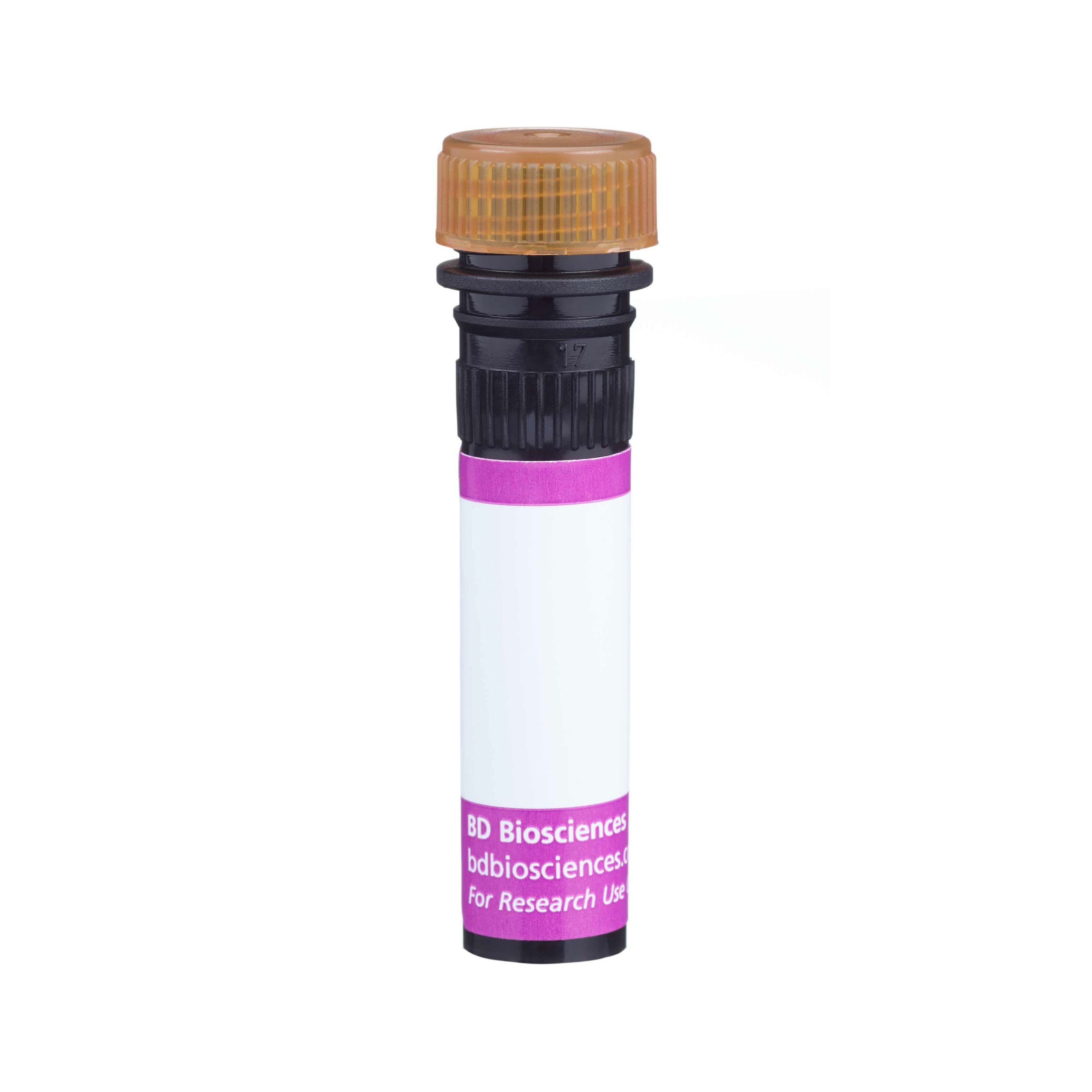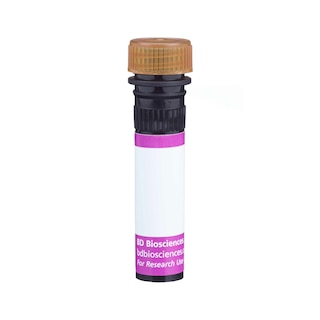Old Browser
This page has been recently translated and is available in French now.
Looks like you're visiting us from {countryName}.
Would you like to stay on the current country site or be switched to your country?


Regulatory Status Legend
Any use of products other than the permitted use without the express written authorization of Becton, Dickinson and Company is strictly prohibited.
Preparation And Storage
Recommended Assay Procedures
For optimal and reproducible results, BD Horizon Brilliant Stain Buffer should be used anytime two or more BD Horizon Brilliant dyes (including BD OptiBuild Brilliant reagents) are used in the same experiment. Fluorescent dye interactions may cause staining artifacts which may affect data interpretation. The BD Horizon Brilliant Stain Buffer was designed to minimize these interactions. More information can be found in the Technical Data Sheet of the BD Horizon Brilliant Stain Buffer (Cat. No. 563794).
Product Notices
- This antibody was developed for use in flow cytometry.
- The production process underwent stringent testing and validation to assure that it generates a high-quality conjugate with consistent performance and specific binding activity. However, verification testing has not been performed on all conjugate lots.
- Researchers should determine the optimal concentration of this reagent for their individual applications.
- An isotype control should be used at the same concentration as the antibody of interest.
- Caution: Sodium azide yields highly toxic hydrazoic acid under acidic conditions. Dilute azide compounds in running water before discarding to avoid accumulation of potentially explosive deposits in plumbing.
- For fluorochrome spectra and suitable instrument settings, please refer to our Multicolor Flow Cytometry web page at www.bdbiosciences.com/colors.
- Please refer to www.bdbiosciences.com/us/s/resources for technical protocols.
- BD Horizon Brilliant Stain Buffer is covered by one or more of the following US patents: 8,110,673; 8,158,444; 8,575,303; 8,354,239.
- BD Horizon Brilliant Violet 786 is covered by one or more of the following US patents: 8,110,673; 8,158,444; 8,227,187; 8,455,613; 8,575,303; 8,354,239.
- Cy is a trademark of Amersham Biosciences Limited.
Companion Products






The BP-3 antibody reacts with CD157, also known as the BP-3 alloantigen or Bone marrow STromal cell antigen-1 (BST-1), found in a variety of common laboratory strains of mice (AKR, BALB/c, CBA/N, C3H/HeJ, C57BL/6, DBA/2, NZB, C.B-17, SJL and Swiss, but not A/J). CD157 is a differentially glycosylated GPI-linked cell-surface glycoprotein with a core protein of 32 kDa and differing patterns of glycosylation in different types of cells. It is a member, along with CD38, of a family of genetically-related ectoenzymes. The BP-3 alloantigen is expressed on the B lineage from the earliest detectable progenitors to circulating immature B lymphocytes, on immature thymocytes up to the expression of the T-cell receptor, on circulating neutrophils, peritoneal macrophages, on subpopulations of stromal cells in peripheral lymphoid organs (but not in bone marrow or thymus), on intestinal epithelial cells, and in the lumen of kidney-collecting tubules. The distribution of CD157 antigen on leukocytes and stromal cells of lymphoid organs suggests that it may be involved in leukocyte-stroma interactions which support the development, migration, and/or responses of leukocyte populations.
The antibody was conjugated to BD Horizon™ BV786 which is part of the BD Horizon Brilliant™ Violet family of dyes. This dye is a tandem fluorochrome of BD Horizon BV421 with an Ex Max of 405-nm and an acceptor dye with an Em Max at 786-nm. BD Horizon BV786 can be excited by the violet laser and detected in a filter used to detect Cy™7-like dyes (eg, 780/60-nm filter).

Development References (6)
-
Dong C, Wang J, Neame P, Cooper MD. The murine BP-3 gene encodes a relative of the CD38/NAD glycohydrolase family. Int Immunol. 1994; 6(9):1353-1360. (Biology). View Reference
-
Dong C, Willerford D, Alt FW, Cooper MD. Genomic organization and chromosomal localization of the mouse Bp3 gene, a member of the CD38/ADP-ribosyl cyclase family. Immunogenetics. 1996; 45(1):35-43. (Biology). View Reference
-
Itoh M, Ishihara K, Hiroi T, et al. Deletion of bone marrow stromal cell antigen-1 (CD157) gene impaired systemic thymus independent-2 antigen-induced IgG3 and mucosal TD antigen-elicited IgA responses. J Immunol. 1998; 161(8):3974-3983. (Biology). View Reference
-
McNagny KM, Bucy RP, Cooper MD. Reticular cells in peripheral lymphoid tissues express the phosphatidylinositol-linked BP-3 antigen. Eur J Immunol. 1991; 21(2):509-515. (Biology). View Reference
-
McNagny KM, Cazenave PA, Cooper MD. BP-3 alloantigen. A cell surface glycoprotein that marks early B lineage cells and mature myeloid lineage cells in mice. J Immunol. 1988; 141(8):2551-2556. (Immunogen). View Reference
-
Ngo VN, Korner H, Gunn MD, et al. Lymphotoxin alpha/beta and tumor necrosis factor are required for stromal cell expression of homing chemokines in B and T cell areas of the spleen. J Exp Med. 1999; 189(2):403-412. (Biology). View Reference
Please refer to Support Documents for Quality Certificates
Global - Refer to manufacturer's instructions for use and related User Manuals and Technical data sheets before using this products as described
Comparisons, where applicable, are made against older BD Technology, manual methods or are general performance claims. Comparisons are not made against non-BD technologies, unless otherwise noted.
For Research Use Only. Not for use in diagnostic or therapeutic procedures.
Report a Site Issue
This form is intended to help us improve our website experience. For other support, please visit our Contact Us page.